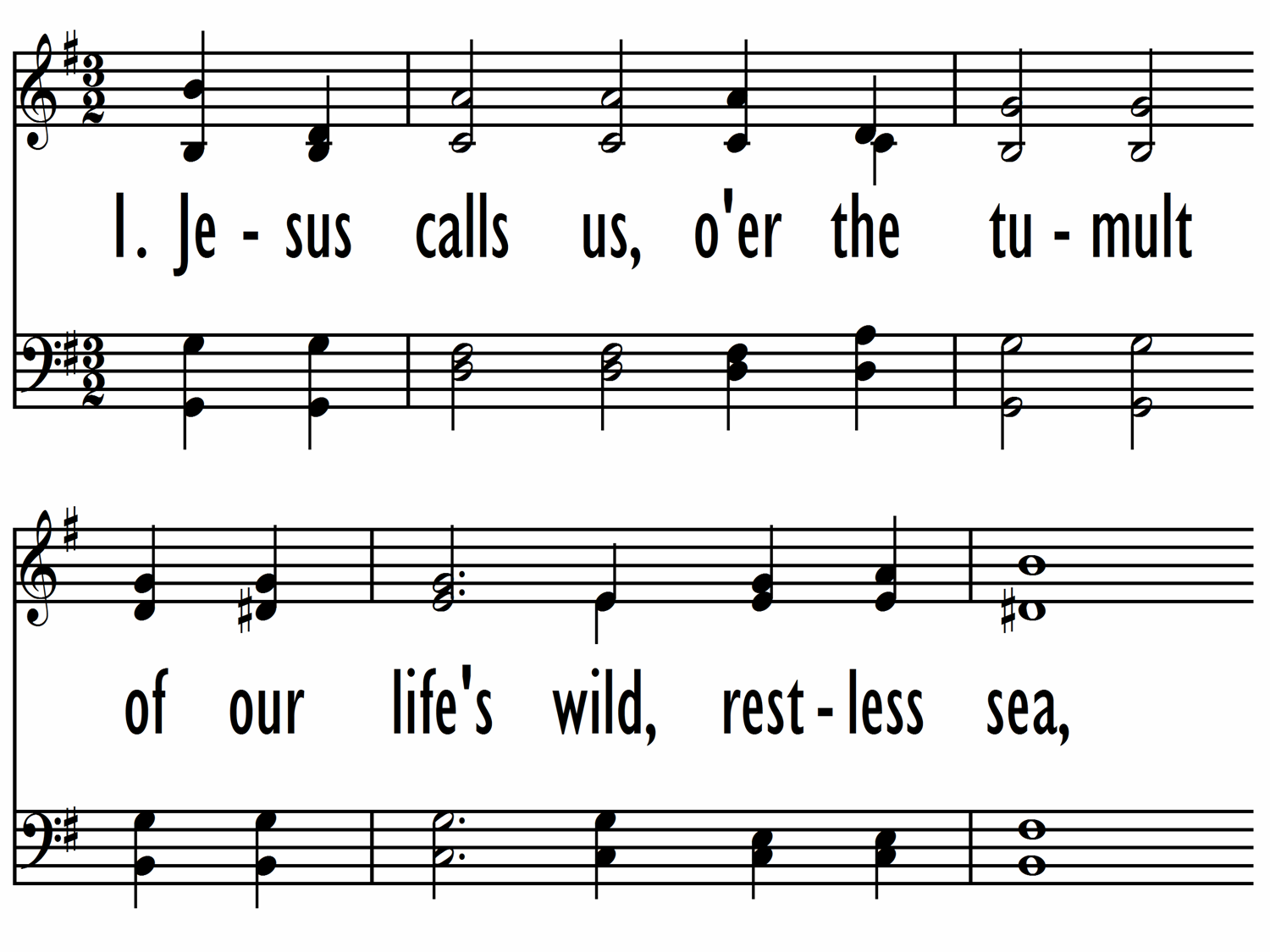- |
User Links
121
Jesus Calls Us, O'er the Tumult
Hymn Information
- First Line
- Jesus calls us, o'er the tumult
- Author
- Mrs. Cecil F. Alexander (1852)
- Tune Name
- GALILEE
- Composer
- William H. Jude (1887)
- Topic
- Biblical Names and Places: Galilee · Call to Discples · Idols/Idolatry · Jesus Christ: Miracles · Jesus Christ: Teachings of
Copyright Information
- Text Copyright
- Public Domain
- Tune Copyright
- Public Domain
- Reprint/Projection Information
- Words and Music: The Words and Music are in the Public Domain; you do not need permission to project or reprint the Words and Music.
Full Text
Scripture References
- · · · · · ·
Thematically related:
- · · ·
- st. 1 =
- st. 3 =
- st. 4 =
Further Reflections on Scripture References
For Jesus’ calling of his disciples see Matthew 4:18-22, Mark 1:16-20, Luke 5:1-11, and John 1:40-42.
For his general call to all disciples see such passages as Matthew 16:24-28, Luke 9:23-27, 14:25-35; and 17:22-37.
Confessions and Statements of Faith References
Further Reflections on Confessions and Statements of Faith References
Stanza 2 warns us against “the vain world’s golden store” and “each idol,” a parallel warning to that of the Decalogue given on Mt. Sinai. Similarly, Heidelberg Catechism, Lord’s Day 34, Question and Answer 95 says: “Idolatry is having or inventing something in which one trusts in place of or alongside of the only true God, who has revealed himself in the Word.”
121
Jesus Calls Us, O'er the Tumult
Introductory/Framing Text
Irish hymn writer Cecil F. Alexander wrote this text for St. Andrew's Day. The appointed gospel reading for that day in the church year concerned Jesus' calling of Simon Peter and Andrew (Matt. 4: 18-20). Her text was published in the Society for the Promotion of Christian Knowledge's (SPCK) Hymns for Public Worship (1852). Though written for a relatively minor saint's day, this hymn quickly gained popularity. It was frequently altered (sometimes mutilated) in later hymnals; Alexander herself prepared an inferior revision about twenty years after the text's first publication.
The thread that binds the stanzas together is the call of Christ. Just as Jesus called the fishermen to be his disciples, he still calls us today to be his followers and obedient servants. His call is for total commitment, a "follow me" that overrides all our earthly "cares and pleasures."
—
Bert Polman
121
Jesus Calls Us, O'er the Tumult
Tune Information
- Name
- GALILEE
- Key
- G Major
- Meter
- 8.7.8.7
Recordings
121
Jesus Calls Us, O'er the Tumult
Author Information
As a small girl, Cecil Frances Humphries Alexander (b. Redcross, County Wicklow, Ireland, 1818; Londonderry, Ireland, 1895) wrote poetry in her school's journal. In 1850 she married Rev. William Alexander, who later became the Anglican primate (chief bishop) of Ireland. She showed her concern for disadvantaged people by traveling many miles each day to visit the sick and the poor, providing food, warm clothes, and medical supplies. She and her sister also founded a school for the deaf. Alexander was strongly influenced by the Oxford Movement and by John Keble's Christian Year. Her first book of poetry, Verses for Seasons, was a "Christian Year" for children. She wrote hymns based on the Apostles' Creed, baptism, the Lord's Supper, the Ten Commandments, and prayer, writing in simple language for children. Her more than four hundred hymn texts were published in Verses from the Holy Scripture (1846), Hymns for Little Children (1848), and Hymns Descriptive and Devotional (1858).
—
Bert Polman
Composer Information
The tune GALILEE was written by William H. Jude (b. Westleton, Suffolk, England, September 1851; d. London, England, August 8, 1922), in 1887. Jude was an organist at the Blue Coat Hospital in Liverpool, England and at Stretford Town Hall, near Manchester, England. He also composed operettas, songs, and edited the following collections: Monthly Hymnal; Minister of Music; Music and the Highter Life, 1904; Mission Hymns, 1911; Festival Hymns, 1916.
—
Rebecca Hoeksema Snippe
Suggestions or corrections? Contact us


 My Starred Hymns
My Starred Hymns






